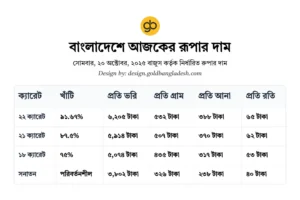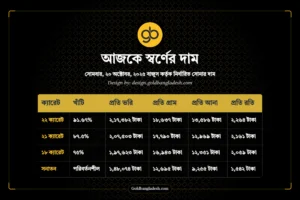Gold has long been considered a safe haven for investors and a store of value across the world, including in Bangladesh. The fluctuating prices of gold can significantly impact the economy, consumer behavior, and investment strategies in the country. The price of gold, like any commodity, is influenced by a variety of global and domestic factors. This article explores why gold prices fluctuate in Bangladesh, breaking down both the internal and external influences that drive price changes.
1. Global Gold Market Dynamics
The price of gold is primarily set on international markets, particularly through commodities exchanges like the New York Mercantile Exchange (NYMEX) and the London Bullion Market. As a small, open economy, Bangladesh’s gold prices are closely linked to global trends. When global demand for gold increases, prices generally rise, and when demand falls, prices drop. Here are some key factors in the global market that impact prices in Bangladesh:
a. Supply and Demand
Global supply and demand dynamics play a significant role in setting the price of gold. If gold mining production decreases or political instability occurs in key mining regions like South Africa, Russia, or China, the global supply of gold can be disrupted. Similarly, an increase in demand from countries like India and China, both of which are major gold consumers, can cause prices to rise.
b. Economic Instability
Gold is often seen as a “safe-haven” investment during times of global economic uncertainty. In times of financial crisis, inflation, or geopolitical tensions, investors tend to flock to gold as a store of value. For instance, during the global financial crisis of 2008, gold prices surged as investors sought security. Similarly, any fears about the global economy or financial markets can push prices upward.
c. Currency Movements
Gold is priced in U.S. dollars, so fluctuations in the value of the dollar often have a direct impact on the price of gold. When the U.S. dollar weakens, gold becomes cheaper for holders of other currencies, driving demand and pushing prices higher. Conversely, when the dollar strengthens, gold becomes more expensive for non-U.S. investors, potentially leading to a decline in gold prices.
d. Interest Rates and Inflation
Central banks, particularly the U.S. Federal Reserve, play a crucial role in influencing the price of gold. When interest rates are low, gold becomes more attractive because the opportunity cost of holding gold (which does not yield interest) is lower. Additionally, when inflation rises, gold is often seen as a hedge against the eroding purchasing power of fiat currencies. These factors combine to drive global gold prices up or down, which then reflects on the market in Bangladesh.
2. Local Factors Impacting Gold Prices in Bangladesh
While global trends play a significant role, there are several local factors specific to Bangladesh that also affect gold prices. These include the demand for gold in the domestic market, import duties, and the regulatory environment.
a. Demand from Domestic Consumers
In Bangladesh, gold is not only seen as a form of investment but also a traditional item used in weddings, festivals, and other cultural ceremonies. The demand for gold jewelry is high, and it tends to spike during certain times of the year, such as during Eid, Durga Puja, and wedding seasons. The cultural importance of gold in Bangladesh means that domestic demand is often strong and can impact prices.
During periods of high demand, gold prices may increase as local jewelers and traders adjust their prices to reflect the market conditions. Conversely, during times of lower demand, prices may stabilize or decrease.
b. Import Duties and Taxes
Bangladesh imports a significant portion of its gold from countries like India, Switzerland, and the UAE. Import duties and taxes imposed by the government on gold can directly affect the final price that consumers pay. Higher import duties can lead to higher prices, while reductions or exemptions can lower prices.
For example, in recent years, Bangladesh has imposed duties and taxes on gold imports in an effort to manage foreign currency reserves and curb illegal smuggling. These taxes are often passed on to consumers in the form of higher prices.
c. Gold Smuggling
Bangladesh has seen instances of gold smuggling due to the high demand for gold and the price differences across borders. Smuggling can distort the gold market by introducing more supply than the market demands, which in turn can artificially affect the price of gold. When smugglers bring gold into the country without paying taxes, they may sell it at lower prices, putting pressure on legitimate dealers.
d. Currency Devaluation
The Bangladeshi Taka (BDT) is vulnerable to fluctuations in value relative to foreign currencies, especially the U.S. dollar. When the taka depreciates against the dollar, the price of gold in Bangladesh tends to rise because gold is priced globally in dollars. For instance, if the dollar strengthens against the taka, the cost of imported gold increases, driving up prices in the local market.
e. Banking and Financial Sector Influence
The policies of Bangladesh’s central bank, Bangladesh Bank, regarding gold trading and imports can also influence prices. For example, if Bangladesh Bank adopts more restrictive policies on gold imports or trading, this can create shortages, leading to price hikes. Additionally, the availability of loans and financing for gold purchases can affect demand and consequently influence prices.
3. Geopolitical Events and Regional Influence
Bangladesh, being in South Asia, is impacted by geopolitical events in neighboring countries, particularly India and China, which are both major gold consumers. For instance:
a. India’s Role in the Gold Market
India is the world’s second-largest consumer of gold, and its economic policies, import duties, and gold demand directly impact the regional gold market, including in Bangladesh. Any changes in Indian import duties or shifts in demand due to local economic conditions or festivals can cause fluctuations in the price of gold in Bangladesh.
b. China’s Influence
While China is further from Bangladesh, its economic policies and demand for gold also influence the global price of gold. As a major consumer of gold, any changes in China’s economic health can have ripple effects across global markets, ultimately affecting Bangladesh’s local prices.
c. Regional Stability
Political instability or conflicts in the region, including in Myanmar and India, can also impact gold prices in Bangladesh. In times of uncertainty or heightened geopolitical tensions, the price of gold often rises due to its safe-haven status.
4. Inflation and Economic Growth
Inflation and economic growth in Bangladesh are two critical factors that influence the price of gold. When inflation rises, people often turn to gold as a hedge against the eroding value of the currency. This increased demand pushes up the price of gold. On the other hand, during periods of economic growth, when disposable income rises, people may also increase their gold purchases, adding upward pressure to prices.
5. Speculation and Investment
Gold is not just bought for cultural or financial security reasons in Bangladesh; it is also seen as an attractive investment opportunity. Speculators, both domestic and international, often buy gold with the expectation that its value will rise. Such investments can influence price fluctuations. The rise of digital platforms and mobile trading apps has also made it easier for people to buy and sell gold, adding more volatility to the market.
Conclusion
The fluctuations in gold prices in Bangladesh are influenced by a combination of global and domestic factors. Global supply and demand, currency movements, interest rates, and inflation all play a critical role, while domestic factors such as demand for gold jewelry, import duties, currency devaluation, and regional geopolitical events also have significant impacts. For Bangladeshi consumers and investors, understanding these factors can help them navigate the sometimes volatile gold market.
Gold’s role as both a cultural symbol and a financial asset ensures that it will remain a critical part of the Bangladeshi economy, making the understanding of its price fluctuations crucial for individuals, businesses, and policymakers alike.







